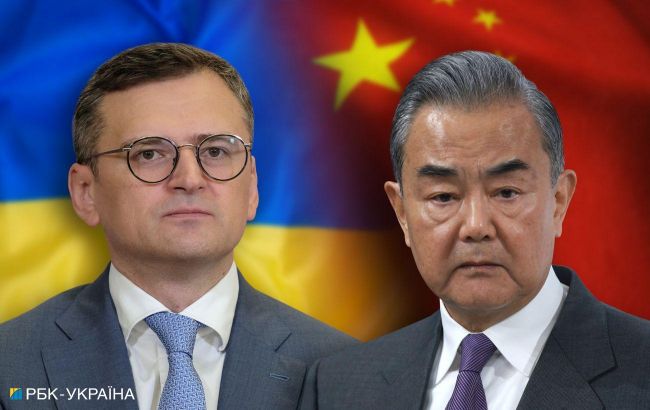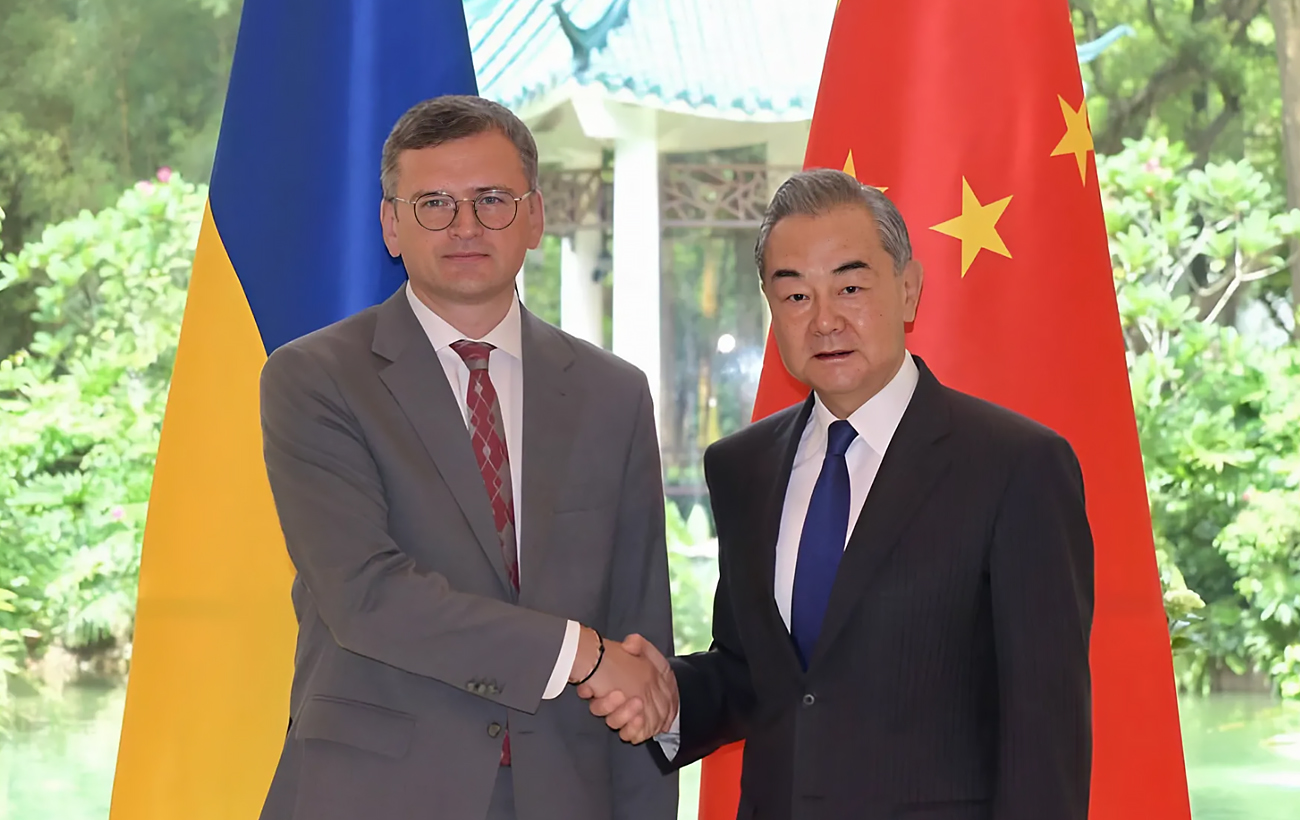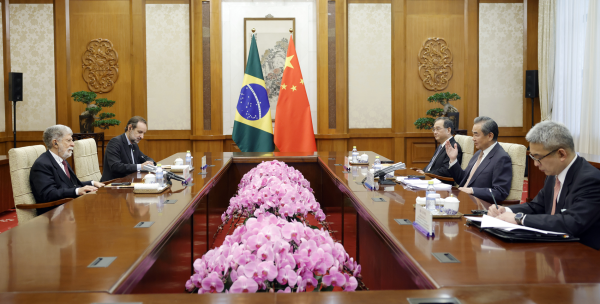Ukraine's Foreign Minister in China – 'signal' to Russia. What's significance of visit in search for peace for Ukraine
 Photo: Dmytro Kuleba and Chinese colleague Wang Yi (collage by RBC-Ukraine)
Photo: Dmytro Kuleba and Chinese colleague Wang Yi (collage by RBC-Ukraine)
Foreign Minister Dmytro Kuleba embarked on a three-day visit to China. The stated goal is to seek ways to achieve a just peace, and today the first statements regarding this have been made.
More details about this, Chinese peace initiatives, and whether the visit might prove to be a breakthrough are covered in the RBC-Ukraine material.
Contents
-
Do China and Brazil have their own plan? What is the Six-Point Consensus?
-
Mediator or second? What to expect from China and will there be a breakthrough in the peace process
Long-awaited visit: Why now and what’s the purpose
Kuleba's trip has become significant. It is the first visit by a top Ukrainian official since the beginning of Russia’s full-scale invasion of Ukraine, and also the first full-fledged bilateral visit by a foreign minister since 2012.
Meetings and negotiations will continue until July 25. They will exchange views on the prospects for relations between the countries, but the main topic is finding ways to end Russian aggression.
“Discussion about peace is worth any effort and time spent on it… The focus is on one issue - peace in Ukraine. We will talk, look for points of contact. We need to avoid competing peace plans; we need to move towards a just and sustainable peace. China can play an important role in this,” Kuleba said.
The importance of the visit is not only discussed in Ukraine. For example, US State Department spokesperson Matthew Miller believes that direct communication will allow China to get information about the consequences of the war firsthand. In his opinion, each country needs to understand the difference between an aggressor and a victim.
Ukraine has been seeking such a visit for several years. But why has it only become possible now? The explanation is simple - China has given its consent for two reasons, explains political scientist and chairman of the Board of the Center for Applied Political Studies PENTA, Volodymyr Fesenko.
The first reason is systemic and relates to Beijing’s interest in being a mediator in future peace negotiations between Kyiv and Moscow. In particular, the Chinese side senses a change in the rhetoric of Ukraine’s leadership. In a recent interview, Volodymyr Zelenskyy hinted at negotiations with Russia and mentioned China as a potential mediator.

Photo: Meeting between Dmytro Kuleba and Wang Yi (t.me/Ukraine_MFA)
The second is situational. China is likely displeased with Vladimir Putin's activities, including his visits to North Korea and Vietnam (the so-called "Chinese backyard"), but even more so with the grand reception of Indian Prime Minister Narendra Modi in Moscow.
Many commentators have noted that this gesture was aimed at China: in effect, Russia is not dependent on it, while India could use Russia as a counterbalance to China. Despite the countries being members of BRICS and SCO (Shanghai Cooperation Organization), relations between Beijing and New Delhi remain complex.
"China didn't like how Modi was received and made a counter-gesture. I think the invitation to Kuleba was a response to the Indian Prime Minister's visit. Of course, the main reason is the peace process with Russia. The problem is that Ukraine and China see it differently," noted Fesenko.
Different views on the peace process as initial results
Today, the Foreign Minister met with his Chinese counterpart Wang Yi in Guangzhou. According to Reuters, citing a source in the Ukrainian delegation, the conversation was in-depth and specific, lasting over three hours.
According to the Chinese Foreign Ministry, Wang Yi assured that Beijing will continue to develop cooperation, food imports, and support for logistical corridors. Regarding the peace track, Kuleba allegedly expressed readiness for reasonable and constructive negotiations with Russia, having "carefully studied the Six-Point Consensus of China and Brazil."
Wang Yi supported the start of negotiations, as ultimately "everything will be decided at the table." However, he emphasized that despite signals from Russia and Ukraine, the time is not yet right and conditions have not matured.
In his statement, Dmytro Kuleba did not mention the consensus. He said that a just peace aligns with China's strategic interests. The position on negotiations is that Kyiv is ready for a peace process with the aggressor, but only at a certain stage when the aggressor agrees to "honestly discuss peace." Currently, there is no such readiness from the Russian side.
Ukraine is clearly trying to involve China in the process on a global platform. Or at least in participating in conferences on specific points of the peace formula, which will take place in Turkiye, Qatar, and Canada as part of preparations for the second summit. Another task is to make China press Russia so that future negotiations do not occur based on its ultimatums.
"The problem is not Ukraine's position, but that Moscow is putting forward unacceptable conditions for the start of negotiations. I think the Ukrainian side explained to China that negotiations are possible, but first, Russia needs to change its position. Whether China will exert influence or not remains an open question, but both Kyiv and Beijing are indeed ready for more active dialogue," emphasizes Fesenko.
Do China and Brazil have their own plan? What is the Six-Point Consensus?
Regarding the role of a mediator, China has long been vying for it. However, unlike other candidates such as Saudi Arabia, Qatar, Turkiye, or the UAE, in the West, China is primarily seen as a Russian partner in reshaping the global order. In particular, in a recent NATO declaration, it was for the first time described as a key enabler of Russia in its war against Ukraine.
Nevertheless, it is believed that only Beijing can push Moscow toward a peace process. However, its vision sometimes raises concerns. Initially, in February 2023, 12 proposals were introduced, which generally call for a ceasefire but do not contain specific steps. Points such as the effective prohibition of Ukraine joining NATO, the lifting of sanctions against Russia, and the absence of provisions for withdrawing occupying troops raised suspicions that the document was coordinated with Russia.
The plan gained renewed attention ahead of the first Peace Summit. Wang Yi announced that the Chinese plan had the support of 45 countries (over 20 either joined or seriously considered it). At the same time, President Volodymyr Zelenskyy accused China of attempting to sabotage the Summit. As a result, several key representatives from the Global South did not come to Switzerland.
Another document - the Six-Point Consensus - was published in May following a meeting between Wang Yi and Brazilian President's Advisor Celso Amorim.
 .
.
Photo: Wang Yi and Celso Amorim proposed a New Peace Plan for Ukraine with Six Points (fmprc.gov.cn)
Firstly, they propose adhering to three de-escalation principles: avoiding provocations, expanding battle zones, and intensifying the front. Secondly, dialogue and negotiations are presented as the only way out of the war conflict.
Thirdly, China and Brazil support an international peace conference recognized by both Russia and Ukraine. This conference is to be held with the participation of the Russian Federation and with "honest discussions of all peace plans."
The fourth point concerns humanitarian aid, the protection of civilians, and a ban on shelling civilian objects. The fifth point addresses the inadmissibility of using nuclear, chemical, and biological weapons, as well as attacks on nuclear power plants. The sixth point calls for countering the division of the world into isolated groups.
The fact that today's statement by Wang Yi features a China-Brazil consensus rather than the former 12 proposals does not mean that China has abandoned them. In essence, this is not a new plan but an updated position. It is possible that Beijing will focus on promoting this updated stance, according to the source.
"There might be additional information later. The intrigue remains regarding the initiative announced in May by China and Brazil to hold a separate peace conference with Ukraine and Russia. The idea exists, but when, under what conditions, and in what format is unknown. China might invite Ukraine to participate," suggests Fesenko.
One way or another, both sides are trying to find common ground. There will be no complete alignment on the issue of peace negotiations, as positions differ significantly. However, Ukraine and China are at least verbally prepared for them, the political scientist added.
Mediator or second? What to expect from China and will there be a breakthrough in the peace process
Dmytro Kuleba's visit is significant because it sends a strong signal. From China’s side, it indicates to Russia that the idea of peace negotiations is still alive and that Beijing is ready to support them. From Ukraine’s side, it signifies a willingness to engage with countries from the Global South, signaling readiness for negotiations and active dialogue with China.
"This is important for Asia, Africa, and some Latin American countries. They might also become more active in their contacts with Ukraine if there is already dialogue with China. Whether specific decisions will be made is uncertain. We’ll see if they are ready to participate in conferences that Ukraine will hold with its partners and whether Ukraine will take part in the China-Brazil conference. Only then can conclusions be drawn," explains Volodymyr Fesenko.
In any case, no major breakthroughs are expected. However, it is not ruled out that China might intensify its mediating efforts and increase contacts with Russia, for example, through the resumption of special envoy Li Hui's visits to Eurasia.
It is already clear that Putin is waiting to see the outcome of the US presidential election. Until then, he is unlikely to make any drastic moves.
"I think the negotiation process will significantly intensify then, especially if Donald Trump wins. And this presents a challenge for China. I’m not sure Trump would be interested in having China as a mediator. At most, China might play a secondary role from the Russian side when the US or the EU is on our side," noted the political scientist.
Regarding the second Peace Summit, the foreign minister is certainly persuading China to participate, which is one of Kuleba’s main goals. However, Fesenko believes that China's ability to compel Moscow to send its delegates is not crucial.
It should be noted that China, Brazil, and other Global South countries insist on involving Russia.
"If the Chinese can influence the Russians and they attend the second Summit, we won’t be against it. But let them persuade them themselves. My subjective opinion is that Peace Summits are not a platform for negotiations but for forming a broad position on ending the war for Ukraine. Real negotiations will happen behind closed doors in a narrow format: the warring parties plus mediators. And they won’t start before the end of the year, after the US election and depending on the military situation in Ukraine," he concluded.
Sources: statements from Foreign Minister Dmytro Kuleba, press releases from the Ministry of Foreign Affairs of Ukraine and China, and comments from political scientist Volodymyr Fesenko.

